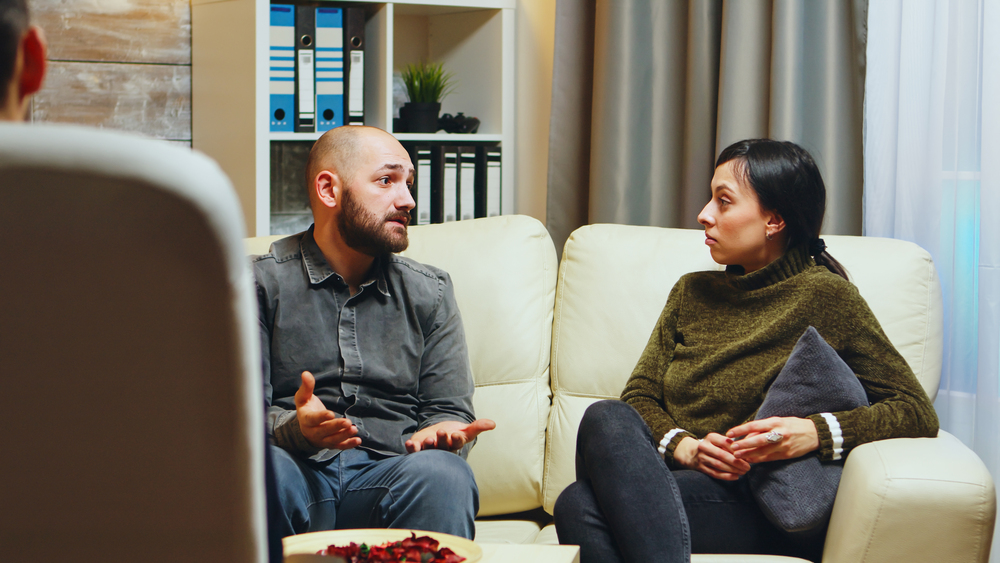Relationships are also very private and intimate and it can be uncomfortable and hard to know when it’s time to consider letting another person, a complete stranger, into this private world of the relationship.
Common Signs It Might Be Time for Couples Therapy
Here are some common situations that can happen in the course of a relationship and how a couples therapist might be able to help.
- We keep having the same fight over and over again and never get anywhere. We humans find comfort in familiarity and predictability even if what is familiar is painfulFeeling comfortable isn’t always equal to feeling good. Comfort can come from predictability and frequent and similar arguments can become conditioned and habitual and provide a new type of If you find yourselves arguing often or having the same argument repeatedly without resolution, therapy can help. A couples therapist can help provide a different lens through which to see the conflict you keep coming up against, providing a chance to deepen insight into the source of the conflict and a chance to deepen understanding of you and your partners individual positions with the goal of breaking the habit and finding a new path forward.
- I’m not sure how to talk to my partner about what I’m feeling. Intimacy needs honesty and open sharing in order to grow, yet it can feel daunting to be vulnerable. Meeting together with a couples therapist can provide skills, support and a safe space in which you can learn how to approach and discuss a challenging topic that needs to be addressed.
- I feel an emotional distance growing between us and I’m not sure what to do. Emotional distance can result from many different factors including lifestyle stress, accumulated hurt, changes in needs and interests and different personal growth trajectories. If you feel disconnected or less affectionate than before, it might be time to address those feelings in therapy. A couples therapist can help to increase understanding of the factors leading to the emotional distance and clarify needs going forward.
- I’ve lost trust in my partner/ My partner broke my trust: Trust is the bedrock of any healthy relationship. Without trust a relationship is doomed. Trust issues, whether from infidelity or other betrayals, often benefit from professional guidance of a couples therapist to discern a path forward to either repair the hurt and rebuild trust or part ways.
- We had similar goals when we started out together, but now we have different life goals and dreams and don’t know where to go from here: Life is full of changes and learning how to adapt and navigate changes coming from external situations or internal feelings and dreams, can take time, creativity and support. Couples therapy can help navigate those differences in life goals as they emerge.

- We just went through or will be going through a huge life change and don’t know what to do next or if we will survive this: Transitions such as marriage, parenthood, death, job loss, moving or relocation can be stressful and wreak havoc in your relationship even when such changes are wanted and desired. Making time to meet together with a couples therapist to regroup and get a sense of
- I feel like we are stuck in our relationship and not sure if we have a future or should end it. If you feel like you’re going in circles without progress in your relationship, or have hit a wall of stagnation, meeting with a couples therapist can help to shed a new perspective on this current state of “stuckness” and a compassionate space to explore what’s best for your future either together or apart.
- One partner is more hesitant about the viability of our relationship going forward. If one partner feels unsure or dissatisfied with the relationship, while individual therapy is advisable first for the hesitant partner to explore and clarify their feelings, it’s then worth it to explore those feelings together in the supportive presence of a couples therapist to avoid blaming and over-personalization.
- We are starting to notice some not so great patterns but we are only in the beginning stages of our relationship. Damaging relationship dynamics don’t happen overnight but over the long haul. If more couples sought out the guidance of a couples therapist at the beginning phases of their relationship when they are first noticing patterns or tendencies, then they would have a much higher chance of navigating these dynamics healthily. It’s not a “bad” sign for a couple to seek therapy in the earlier times of their relationship, if fact it can be a sign of health and real commitment.
- There’s nothing wrong but we just want to strengthen what we have created and find ways to be our best selves together. There doesn;t have to be something wrong in order to seek the support of a couples therapist. In fact, I believe if more people met with a couples therapist even in the beginning phases of their relationship, more people would report higher degrees of satisfaction in their relationship as time goes on. So yes, sometimes couples seek therapy proactively to strengthen their relationship or enhance intimacy, even if there aren’t any major issues.
Couples therapy isn’t only for when things are rough or troubling. Although, waiting too long to seek the support of a couples therapist when things are tough can be more damaging as unresolved issues can lead to a build up of resentment, a hardening of defensive positions and a lessening of empathy or care to understand one another.
If any of these resonate, it could be helpful to consider reaching out to a couples therapist for a consultation. Couples therapy can provide a safe space to explore the nuances of your relationship and help you work together towards building healthier dynamics and a more fulfilling relationship.
Resources:
Doherty, W. J., Harris, S. M., Hall, E. L., & Hubbard, A. K. (2021). How long do people wait before seeking couples therapy? A research note. Journal of marital and family therapy, 47(4), 882-890.
Hubbard, A., Harris, S. A Critical Review of Help-Seeking for Couples Therapy: Clinical Implications and Next Steps. Contemp Fam Ther 42, 152–162 (2020).



